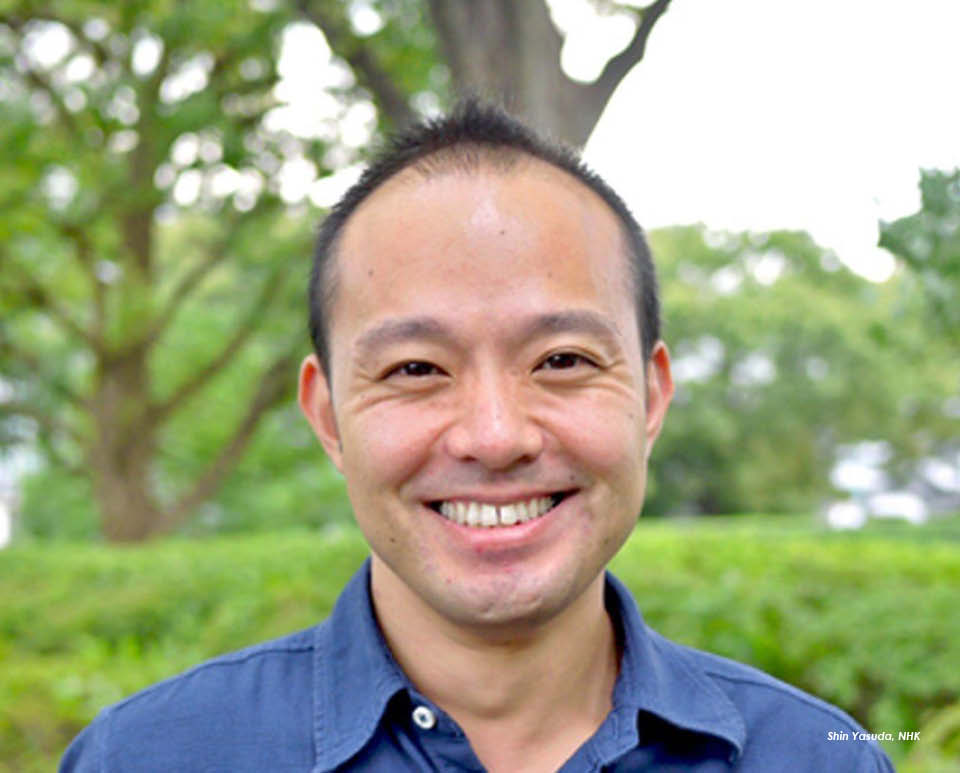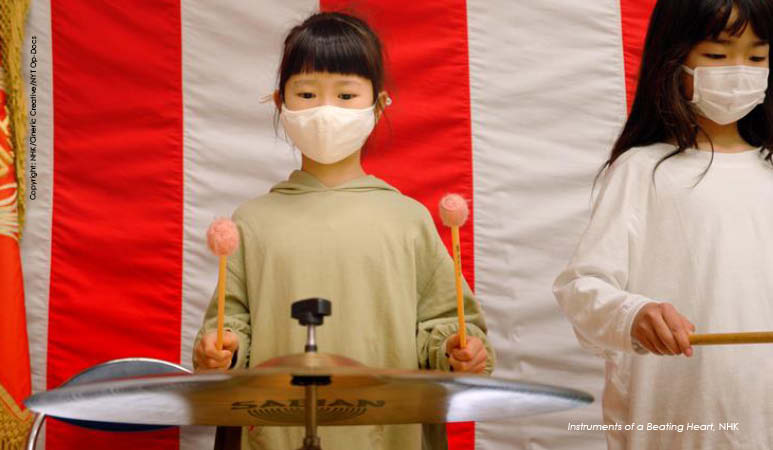
In October 2024, 25 of the world’s top extreme runners gathered in the Kingdom of Bhutan for one of the most remote and challenging foot races ever – the Snowman Race, 175 kilometers of Himalayan wilderness, with an average elevation of about 4,300m and multiple peaks rising to 5,470m. Led by the Royal Government of Bhutan the idea behind the five-day Snowman Race is to draw attention to climate change.
Royal Bhutan Army runner, Sangay Wangchuk, was first over the finish line for the second edition of the epic race, with a cumulative time of 28 hours, 31 minutes, and 14 seconds. Germany’s Rosanna Buchauer claimed the women’s title, finishing at 31:58:02.
For Bhutan, the race is part of its promise to remain carbon neutral forever. For Japanese broadcaster NHK the race is part of a long-held documentary culture with time, money and vision to go where few others dare.
On 23 June, during Sunny Side of the Doc in La Rochelle, NHK presents Run Against Time: The Snowman Race, told through the eyes of participating athletes. NHK, in collaboration with Bhutan’s Bhutan Broadcasting Service (BBS), is the first broadcaster in the world to provide exclusive and complete coverage of this extraordinary race.
The international debut of the 49-minute feature comes a dozen years after the publicly funding platform premiered Legends of the Deep: Giant Squid, the first-ever colour footage of a live giant squid in its natural habitat, and a few months after the release of Deep Ocean: Kingdom of the Coelacanth.
Co-produced by NHK, BBS and French companies Gedeon (which has European distribution rights through Terranoa) and Ushuaia TV, Run Against Time: The Snowman Race is part of NHK’s 100th anniversary celebrations. The Sunny Side agenda also features a special session on NHK’s co-productions; the broadcaster has been involved in international projects since the 1980s.
In the run-up to the four-day documentary festival, Shin Yasuda, NHK’s senior producer, international co-productions and acquisitions, content value development center, told ContentAsia that co-productions were even more important “in an age where public media around the world is facing budget constraints due to changes in the media landscape”.
Yasuda spoke about high viewer expectation for grand-scale programming and NHK’s ongoing quest for new styles of storytelling as well as event programmes...
In October 2024, 25 of the world’s top extreme runners gathered in the Kingdom of Bhutan for one of the most remote and challenging foot races ever – the Snowman Race, 175 kilometers of Himalayan wilderness, with an average elevation of about 4,300m and multiple peaks rising to 5,470m. Led by the Royal Government of Bhutan the idea behind the five-day Snowman Race is to draw attention to climate change.
Royal Bhutan Army runner, Sangay Wangchuk, was first over the finish line for the second edition of the epic race, with a cumulative time of 28 hours, 31 minutes, and 14 seconds. Germany’s Rosanna Buchauer claimed the women’s title, finishing at 31:58:02.
For Bhutan, the race is part of its promise to remain carbon neutral forever. For Japanese broadcaster NHK the race is part of a long-held documentary culture with time, money and vision to go where few others dare.
On 23 June, during Sunny Side of the Doc in La Rochelle, NHK presents Run Against Time: The Snowman Race, told through the eyes of participating athletes. NHK, in collaboration with Bhutan’s Bhutan Broadcasting Service (BBS), is the first broadcaster in the world to provide exclusive and complete coverage of this extraordinary race.
The international debut of the 49-minute feature comes a dozen years after the publicly funding platform premiered Legends of the Deep: Giant Squid, the first-ever colour footage of a live giant squid in its natural habitat, and a few months after the release of Deep Ocean: Kingdom of the Coelacanth.
Co-produced by NHK, BBS and French companies Gedeon (which has European distribution rights through Terranoa) and Ushuaia TV, Run Against Time: The Snowman Race is part of NHK’s 100th anniversary celebrations. The Sunny Side agenda also features a special session on NHK’s co-productions; the broadcaster has been involved in international projects since the 1980s.
In the run-up to the four-day documentary festival, Shin Yasuda, NHK’s senior producer, international co-productions and acquisitions, content value development center, told ContentAsia that co-productions were even more important “in an age where public media around the world is facing budget constraints due to changes in the media landscape”.
Yasuda spoke about high viewer expectation for grand-scale programming and NHK’s ongoing quest for new styles of storytelling as well as event programmes with new discovery/big impact on a global scale.
In addition, he says, “co-productions have allowed us to bring Japanese stories to the global audience”. These range from science documentaries that analyse the mechanism of megaquakes and disaster-prevention measures to natural history documentaries that explore the wonders of Japanese wildlife.
“As the world becomes more complex and polarised, international co-productions also play an important role in seeking solutions to common problems we face as global citizens,” Yasuda says.
“It is becoming more and more difficult for one country or region alone to solve problems that affect all of us such as climate change and global conflict,” he adds, reiterating the call for “like-minded broadcasters and media companies around the world join hands to look for seeds of resolution”.
“This may sound idealistic, but I think we live in a time when we need to remind ourselves of the spirit of altruism, which I think was at the core of international co-production when it was first conceived,” Yasuda says, pointing to NHK’s participation in Global Doc, an initiative led by France Televisions in which public media companies join forces to support and co-finance ambitious documentary projects with universal appeal.
“As the media industry becomes more diverse and fragmented, we believe that these partnerships play an important role in making sure that aspiring filmmakers are supported and that well-researched, high-quality content are made and delivered to the public”.
NHK’s challenges are similar to public broadcasters around the world – shrinking broadcast slots, budget cuts, and the need to better engage younger audiences.
Yasuda flies the flag for immersive formats able to deliver “meaningful and extraordinary experiences even beyond broadcast”. These include dome theater screenings and cutting-edge technologies, like the 8K×8K VR camera developed by NHK’s Science & Technology Research Laboratories to document World Heritage sites such as the Roman Catholic basilica, Sagrada Família, in Spain.
Recognition for NHK’s initiatives this year came in the form of an Oscar nomination of short documentary film, Instruments of a Beating Heart.
The film was the result of many years of collaboration between independent documentary filmmaker Ema Ryan Yamazaki and NHK, which Yasuda says not only highlights NHK’s filmmaking abilities, but also “proves the importance of long-term relationships”.
(Story continues below)

Before Instruments of a Beating Heart, NHK and Yamazaki co-produced feature documentary film, Koshien: Japan’s Field of Dreams (2019) and short documentary film Temple Family (2021). For both projects, Yamazaki worked with independent cinematographers.
In 2021, Yamazaki and NHK launched the co-production project, Elementary School Project (from which Instruments was born). This time, Yamazaki teamed up with NHK’s in-house cinematographer, Kazuki Kakurai (Deep Ocean, Conveying the Horrors of War: Ukraine’s Frontline Journalists).
Yamazaki and Kakurai filmed for a year from the spring of 2021, wrapping with more than 700 hours of footage over 150 days at the school.
“One of NHK’s missions is to help Japanese filmmakers find their own voice and deliver Japanese stories to the global audience. The Oscar nomination has renewed our sense of mission to keep looking for new talent and forge new partnerships that can create global impact,” Yasuda says.
Among the co-production works in progress are Hidden Japan, a two-part series depicting nature from the uniquely Japanese perspective called ‘en’.
“En is a Japanese word often translated as ‘connection’ or ‘relationship’ in English, Yasuda explains. “But it carries a deeper, more nuanced meaning: the bonds or fateful connection between people and symbiosis with nature.”
A version of this article appeared in ContentAsia's eNewsletter of 16 June 2025































